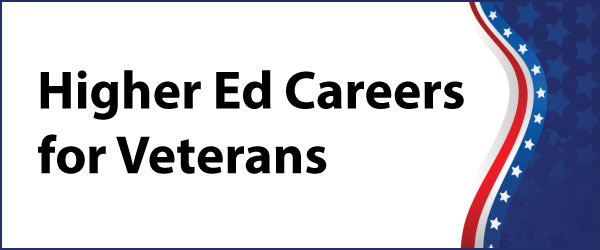Higher Ed Careers for Veterans: Student Affairs


Are you exploring higher ed careers for veterans? Meet Elisa East. She is the Interim Director of the Military and Veterans Program at San Diego State University (SDSU). Elisa leads and oversees all military-related functions, educational benefits processing, programming initiatives, student engagement, and supportive services for the diverse military-connected student population at the Joan and Art Barron Veterans Center (JABVC). With her equity and inclusion mindset, commitment to student success, and deep understanding of military culture, Elisa cultivates and fosters an environment that promotes academic achievement, personal growth, and professional development. She is a United States Army veteran, holding a B.A. in Psychology and an M.A. in Education with an emphasis in Counseling from SDSU.
What made you consider a career in higher education?
I was inspired to pursue a career in higher education because of my passion for learning and the desire to make a positive impact on students’ lives.
Did you run into any specific challenges as a veteran transitioning to higher ed and if so how did you manage it/them?
Transitioning to higher education posed some challenges, such as adapting to the different work culture and adjusting to the academic environment. I managed these challenges by seeking guidance from mentors, participating in professional development opportunities, and being open to learning and growth.
Did anything surprise you about working in higher ed that you did not expect?
Working in higher education surprised me with its dynamic and ever-evolving nature. I did not anticipate the breadth of responsibilities and the constant need to adapt to changing student needs and institutional priorities. This works for me as it prevents me from becoming bored.
Tell us about your current role.
In my current role, I serve as the Interim Director of the Military and Veterans Program. I oversee the processing of federal and state educational benefits, develop existing and new programming initiatives, facilitate student engagement opportunities, and provide supportive services to enable students to progress toward and achieve their educational objectives.
What are some of the benefits of working in higher education?
Benefits of working in higher education include the opportunity to make a difference in students’ lives, intellectual stimulation, a supportive and collaborative work environment, and access to professional development and educational resources.
How do you think being a veteran has served you in this role?
Being a veteran has served me in this role by providing me with valuable skills such as discipline, leadership, and adaptability. These traits have been instrumental in effectively working with diverse student populations and navigating complex organizational structures. It’s also provided me with the ability to understand the nuances of military life and culture that often cannot be articulated unless you experienced it.
What do you wish you knew before moving into a career in higher education?
Before moving into a career in higher education, I wish I knew more about the intricacies of the academic landscape, including institutional dynamics, funding challenges, and the importance of building strong networks and collaborations.
Did your military experience easily translate into a civilian occupation? If not, did you have to receive additional training and/or certifications?
While some aspects of military experience did translate well into civilian occupations, additional training, education, and certifications were necessary to meet the specific requirements of a higher education role. It is important to leverage transferable skills and seek professional development opportunities to bridge any knowledge gaps.
What similarities are there (if any) between working in higher education and serving in the military?
Similarities between working in higher education and serving in the military include the importance of teamwork, leadership, and a commitment to a larger mission. Both environments require adaptability, resilience, and a focus on serving others.
Check out more resources for veterans exploring careers in higher ed.
About the Author: Sara Ermeti has worked in HR leadership for nearly 30 years in various industries such as higher education, NFP, Religious, Financial, Entertainment, and Transportation. She is also an adjunct professor teaching courses in HR and Business. Sara is a certified coach and resume writer offering individual and business consulting through Esperto HR Office.
